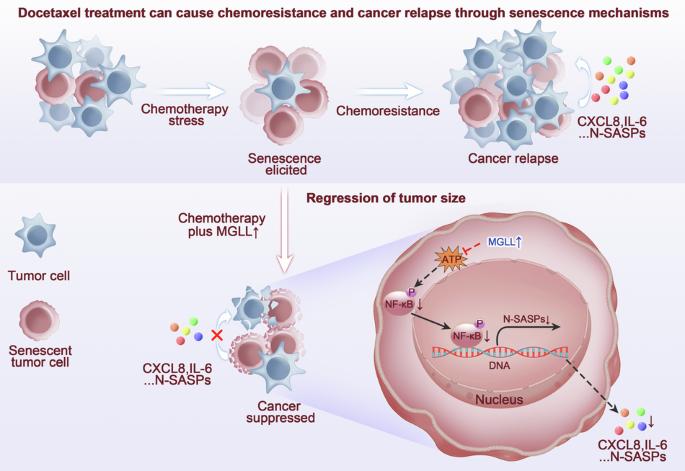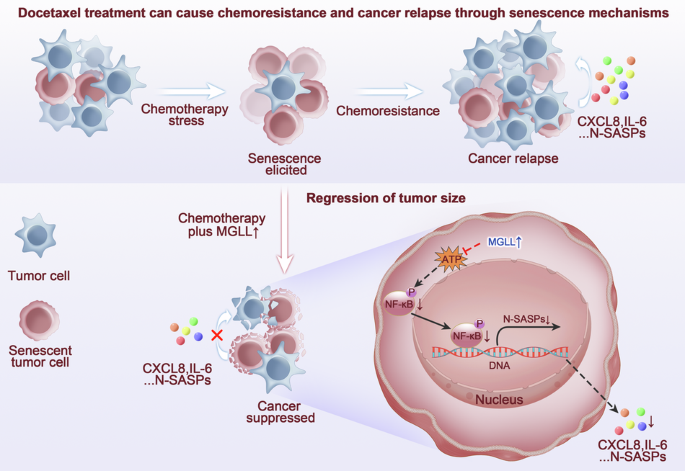Monoacylglycerol lipase blockades the senescence-associated secretory phenotype by interfering with NF-κB activation and promotes docetaxel efficacy in prostate cancer
IF 6.9
1区 医学
Q1 BIOCHEMISTRY & MOLECULAR BIOLOGY
引用次数: 0
Abstract
Metabolic reprogramming and cellular senescence greatly contribute to cancer relapse and recurrence. In aging and treated prostate, persistent accumulating senescence-associated secretory phenotype (SASP) of cancer cells often limits the overall survival of patients. Novel strategic therapy with monoacylglycerol lipase (MGLL) upregulation that counters the cellular and docetaxel induced SASP might overcome this clinical challenge in prostate cancer (PCa). With primary comparative expression and survival analysis screening of fatty acid (FA) metabolism signature genes in the TCGA PCa dataset and our single center cohort, MGLL was detected to be downregulated in malignancy prostate tissues and its low expression predicted worse progression-free and overall survival. Functionally, overexpression of MGLL mainly suppresses NF-κB-driven SASP (N-SASP) which mostly restricts the cancer cell paracrine and autocrine tumorigenic manners and the corresponding cellular senescence. Further investigating metabolites, we determined that MGLL constitutive expression prevents lipid accumulation, decreases metabolites preferably, and consequently downregulates ATP levels. Overexpressed MGLL inhibited IκBα phosphorylation, NF-κB p65 phosphorylation, and NF-κB nuclear translocation to deactivate NF-κB transcriptional activities, and be responsible for the repressed N-SASP, partially through reducing ATP levels. Preclinically, combinational treatment with MGLL overexpression and docetaxel chemotherapy dramatically delays tumor progression in mouse models. Taken together, our findings identify MGLL as a switch for lipase-related N-SASP suppression and provide a potential drug candidate for promoting docetaxel efficacy in PCa.


单酰基甘油脂肪酶通过干扰NF-κB的激活来阻断衰老相关的分泌表型,并促进多西他赛在前列腺癌中的疗效。
代谢重编程和细胞衰老在很大程度上导致癌症复发。在衰老和接受治疗的前列腺中,癌细胞持续积累的衰老相关分泌表型(SASP)往往会限制患者的总体生存。通过上调单酰基甘油脂肪酶(MGLL)来对抗细胞和多西他赛诱导的衰老相关分泌表型的新型策略疗法可能会克服前列腺癌(PCa)的这一临床挑战。通过对 TCGA PCa 数据集和我们的单中心队列中的脂肪酸(FA)代谢特征基因进行初步比较表达和生存分析筛选,发现 MGLL 在恶性前列腺组织中下调,其低表达预示着更差的无进展生存期和总生存期。在功能上,MGLL 的过表达主要抑制 NF-κB 驱动的 SASP(N-SASP),而 NF-κB 驱动的 SASP 主要限制癌细胞的旁分泌和自分泌致瘤方式以及相应的细胞衰老。通过对代谢物的进一步研究,我们确定 MGLL 的组成型表达可防止脂质积累,减少代谢物,从而降低 ATP 水平。过表达的 MGLL 可抑制 IκBα 磷酸化、NF-κB p65 磷酸化和 NF-κB 核转位,从而使 NF-κB 转录活性失活,并部分通过降低 ATP 水平导致 N-SASP 受抑。在临床前研究中,MGLL 过表达与多西他赛化疗的联合治疗可显著延缓小鼠模型的肿瘤进展。综上所述,我们的研究发现 MGLL 是脂肪酶相关 N-SASP 抑制的开关,为促进多西他赛在 PCa 中的疗效提供了潜在的候选药物。
本文章由计算机程序翻译,如有差异,请以英文原文为准。
求助全文
约1分钟内获得全文
求助全文
来源期刊

Oncogene
医学-生化与分子生物学
CiteScore
15.30
自引率
1.20%
发文量
404
审稿时长
1 months
期刊介绍:
Oncogene is dedicated to advancing our understanding of cancer processes through the publication of exceptional research. The journal seeks to disseminate work that challenges conventional theories and contributes to establishing new paradigms in the etio-pathogenesis, diagnosis, treatment, or prevention of cancers. Emphasis is placed on research shedding light on processes driving metastatic spread and providing crucial insights into cancer biology beyond existing knowledge.
Areas covered include the cellular and molecular biology of cancer, resistance to cancer therapies, and the development of improved approaches to enhance survival. Oncogene spans the spectrum of cancer biology, from fundamental and theoretical work to translational, applied, and clinical research, including early and late Phase clinical trials, particularly those with biologic and translational endpoints.
文献相关原料
| 公司名称 | 产品信息 | 采购帮参考价格 |
|---|
 求助内容:
求助内容: 应助结果提醒方式:
应助结果提醒方式:


